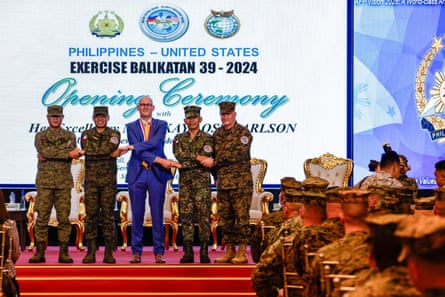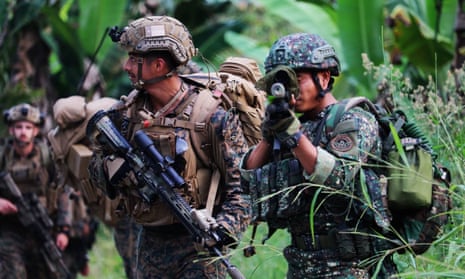A Chinese military official has warned against countries flexing “gunboat muscles”, as the Philippines and US begin three weeks of unprecedented joint drills in the South China Sea.
The annual Balikatan, or “shoulder-to-shoulder” drills, began on Monday and will run until 10 May. For the first time the exercises will be held beyond the Philippines’ territorial waters – 12 nautical miles offshore – and will involve the Philippines coast guard (PCG) in an active role. They will also involve other countries in secondary or observer roles, including Australia and France.
This year’s drills are the second largest in its history, with 17,600 personnel simulating the retaking of islands near Taiwan. The Philippines military says the exercises are “not explicitly tied to any particular country’s actions”, but observers widely believe them to be in response to China.
At a naval conference in Qingdao on Monday, Zhang Youxia, vice-chairman of the Central Military Commission which oversees China’s armed forces, said the sea should not be an arena in which countries can flex their “gunboat muscles”.
“Reality has shown that those who make deliberate provocations, stoke tensions, or support one side against another for selfish gains will ultimately only hurt themselves,” Zhang said.
“Carrying out maritime containment, encirclement and island blockades will only plunge the world into a vortex of division and turbulence.”
Zhang, who is a close ally of President Xi Jinping, said China was committed to resolving maritime disputes through dialogue but wouldn’t allow itself to be “abused”.

China’s government claims most of the South China Sea, including islands and shoals also claimed by other countries like the Philippines. Beijing repeatedly says it pursues dialogue to resolve the disputes, but makes clear this is largely on its own terms.
China rejected a 2016 ruling by an international tribunal that found its sweeping claims had no legal basis. It has continued to build military structures, occupy islands, and reclaim lands in the South China Sea at a greater rate than other competing nations, and uses its coast guard, navy and paramilitary fishing fleet known as the maritime militia, to maintain a heavy presence in the area, occasionally engaging in confrontations with others.
Experts say China’s South China Sea disputes with the Philippines are in danger of escalating. The coast guards of the two nations have come to blows several times in recent months, including in collisions which each side accuses the other of deliberately causing.
The Chinese coast guard has also used powerful water cannon against Philippines vessels attempting to resupply a strategic Philippines military outpost on the disputed Second Thomas Shoal.
Tensions between the two nations have also deepened as the Philippines’ government of Ferdinand Marcos Jr strengthens its relationship with its treaty-ally, the US, and other allies like Japan, after the previous president had drawn closer to China.
Zhang was addressing the 19th biennial meeting of the western Pacific naval symposium, which sees more than 180 senior navy representatives from 29 countries gather for closed door meetings and public events. Representatives from the US, UK, France, Australia, Cambodia, Russia and Japan, are among the attendees according to Chinese state media.
The meetings are expected to include discussions on the Code for Unplanned Encounters at Sea, a set of guidelines meant to de-escalate tensions between militaries at sea.
Reuters contributed to this report
